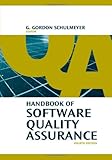Handbook of Software Quality Assurance
SQA (software quality assurance) is a critical factor that all software engineers and developers need to master, and this thoroughly revised fourth edition of the popular book, “Handbook of Software Quality Assurance”, serves as a one-stop resource for complete and current SQA knowledge. Emphasizing the importance of CMMI[registered] and key ISO requirements, this unique book discusses a wide spectrum of real-world experiences and key issues presented in papers from leading experts in the field. The fourth edition is a significant update to past editions, providing the very latest details on current best practices and explaining how SQA can be implemented in organizations large and small. Practitioners find an updated discussion on the American Society for Quality (ASQ) SQA certification program, covering the benefits of becoming an ASQ certified software quality engineer. The book also helps readers better understand the requirements of the ASQ’s CSQE examination.
List Price: $ 109.00
Price: $ 88.78
Check This:
 The Black Belt Memory Jogger: A Pocket Guide for Six Sigma Success
The Black Belt Memory Jogger: A Pocket Guide for Six Sigma SuccessA low cost tool that can bring you Six Sigma success. Help all of your Black Belts become the teachers, mentors, and leaders you k…
 Lean Six Sigma – Black Belt Final Exam
Lean Six Sigma – Black Belt Final ExamThis text is intended as an aid to anyone studying Lean Six Sigma, this text proivdes a variety of formulas you’ll be required to …
 The Lean Six Sigma Pocket Toolbook: A Quick Reference Guide to 100 Tools for Improving Quality and Speed
The Lean Six Sigma Pocket Toolbook: A Quick Reference Guide to 100 Tools for Improving Quality and SpeedA BUSINESSWEEK BESTSELLER Bestselling Lean Six Sigma author Michael George provides the first pocket guide for deployers of Lea…
Find More Six Sigma Black Belt Products



A true classic and the best SQA book for serious SQA pros,
This book is one of the most comprehensive treatments of SQA on the market. It is a collection of essays that cover every imaginable aspect of SQA with an overall focus to prepare candidates for the American Society of Quality’s software quality engineer certification (CSQE). Each author is an acknowledged expert in the field, and each essay is well developed and gets to the essence of the topic.
Although the primary intent of this book is to prepare readers for the CSQE exam, this book contains the building blocks to develop a world-class software engineering process group and/or to move up the capability maturity model (CMM)ladder or achieve a higher level of capability within the context of SPICE (Software Process Improvement Capability dEtermination). In particular CMM and SPICE are ‘assessed’ levels of capability maturity with no prescribed techniques. This book provides a collection of techniques that will fit nicely into goals for increasing the maturity level of an organization regardless of the framework (CMM or SPICE) that is selected. What I like about this book is that it also addresses in detail how SQA aligns to ISO 9000-3, and the coverage of ISO/IEC 12207 and IEEE-STD-1074 (both of which are important international standards that should be considered as a part of an organization’s strategy with respect to CMM or SPICE).
Chapters that provide excellent material supporting CMM and SPICE initiatives are: 1 & 2, SQA-Coming to Terms and How Does SQA Fit In? (a complete picture of the many components and considerations of an effective SQA function); 5, Software Quality Program Organization (great advice on organizing SQA within your company and aligning it to development and project management); 9, Inspections as an Up-Front Quality Technique (how to integrate inspections into a comprehensive, proactive quality posture); 10, Software Configuration Management (essential to any quality initiative regardless of whether the end goal is CMM, SPICE, ISO 9000 or compliance with international standards); 15, SQA Metrics (the foundation of SPICE and higher CMM levels); 19 & 20, Statistical Methods and Software Reliability Management (another set of foundation areas that are essential to SPICE and higher CMM levels).
Other chapters provide material that is specific to preparing for the CSQE examination or implementing any quality program that is focused on software quality assurance. I particularly liked the chapter on personnel requirements, which covered the people and process elements of SQA, and the cost of software quality. The latter gives you ample information for justifying SQA from a business perspective. This material is further augmented by a chapter on effective methods of IS quality assurance, which bridges the applications delivery (development) and service delivery (support and operations) domains.
SQA is not easy to organize and implement. Moreover, it is a highly technical discipline that is more engineering focused than most disciplines in development and operations. As such this book is definitely not for the faint-of-heart. It is intended for CSQE candidates and organizations that have attained some level of maturity and are striving to move higher up the capabilities ladder. If you are looking for a more basic book on SQA I recommend Customer Oriented Software Quality Assurance by Frank P. Ginac. However, if you are an experienced SQA practitioner, heading a software engineering process group, devising a plan for improving capability maturity for CMM or SPICE, or are preparing for the CSQE examination the Handbook of Software Quality Assurance is the best book you can have. It is a classic and earns a solid 5 stars.
Was this review helpful to you?

|